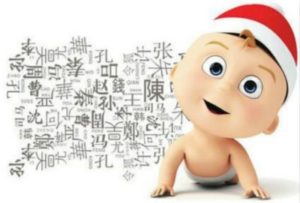Different from the westerners’ name structure which is “name + family name”,the Chinese name is in the reverse order: “family name + name”, and the process of naming is a little complex.
Various ways to give names in China
-

Credit: YourChineseAstrology
A name with expectations of parents. For example, in the name Chen Duan, the word Duan(端) means having good character. The name shows that the parents want their daughter to be a person with good character.
- A name combined the mom’s name and the dad’s name, which is to express that the child is the fruit of parents love. For example, the name Wen Aima(文爱马), means dad whose surname is wen(文) loves mom whose surname is ma(马).
- A name based on the birthplace or the native place of parents to memory or express the identity, such as the name Jingsheng(京生), means a person was born in Beijing, Husheng(沪生), means a person was born in Shanghai.
- Name the child based on the time or the season of birth. For example, the name Lamei(腊梅), means a baby girl being born in the twelfth month of Chinese lunar calendar, in Chinese we call it “腊月”.
- Some babies are born with astonishing phenomenon. To in memory of this, the parents will name the baby with characters related to the phenomenon.
- Some are on the basis of the seniority among his brothers and sisters. And there will always be one character in the name which is the same as the one in his brother or sister’s name such as Jianhua(建华)and Zhenhua(振华).
Two most important traditional ways to give names in China
Chinese has a traditional basis to give names—-the genealogy tree. This principle started from the Han dynasty. Almost every old family in China has a certain Zibei spectrum, which is always a poem or a couplet entrusted with great expectations of the family. A character of this poem is embedded in one generation’s name, and the character next to it will be used in the next generation’s name. The characters used by each generation must follow the order of the poem or the couplet. If the characters are used up, they will restart the poem or create a new spectrum, which is a way of inheritance.
In addition, parents would like to name their child by calculating the eight characters of Fengshui. However, nowadays they will go to naming website to test their baby’s eight characters. If a baby is born at 0:00, 25 march, 2010, his eight characters will be geng(庚), yin(寅), ji(己), mao(卯), jia(甲), xu(戌), jia(甲), zi(子). Then the five elements will be worked out with the basis of the eight characters. The Gan-Zhis of the eight characters correspond respectively with the five elements and with the rules, it can be calculated that the baby’s five elements are gold(金), wood(木), soil(土), wood(木), wood(木), soil(土), wood(木), water(水).
Generally, it is suitable that there are two the same elements. It is obvious that this baby’s five elements are lack of fire and it is better to use a character which belongs to the element fire in his name, such as yan(炎) and feng(烽).
Generally, names reflect the characteristics of times. Before New China established, Chinese parents tend to use characters in famous and beautiful poems to show their well-educated. Afterwards, following the trend of the era, the names always have the feature of the time, such as Jianguo(建国)and Aihua(爱华). Since 1990s,parents would gradually like to use the characters which exist in the dictionary but are seldom spoken in daily life.
In short, name is an important part of Chinese culture. And different time will have different characteristics. However, name gives a sense of belonging and expectation essentially.
By Amanda and Diane
See also:
